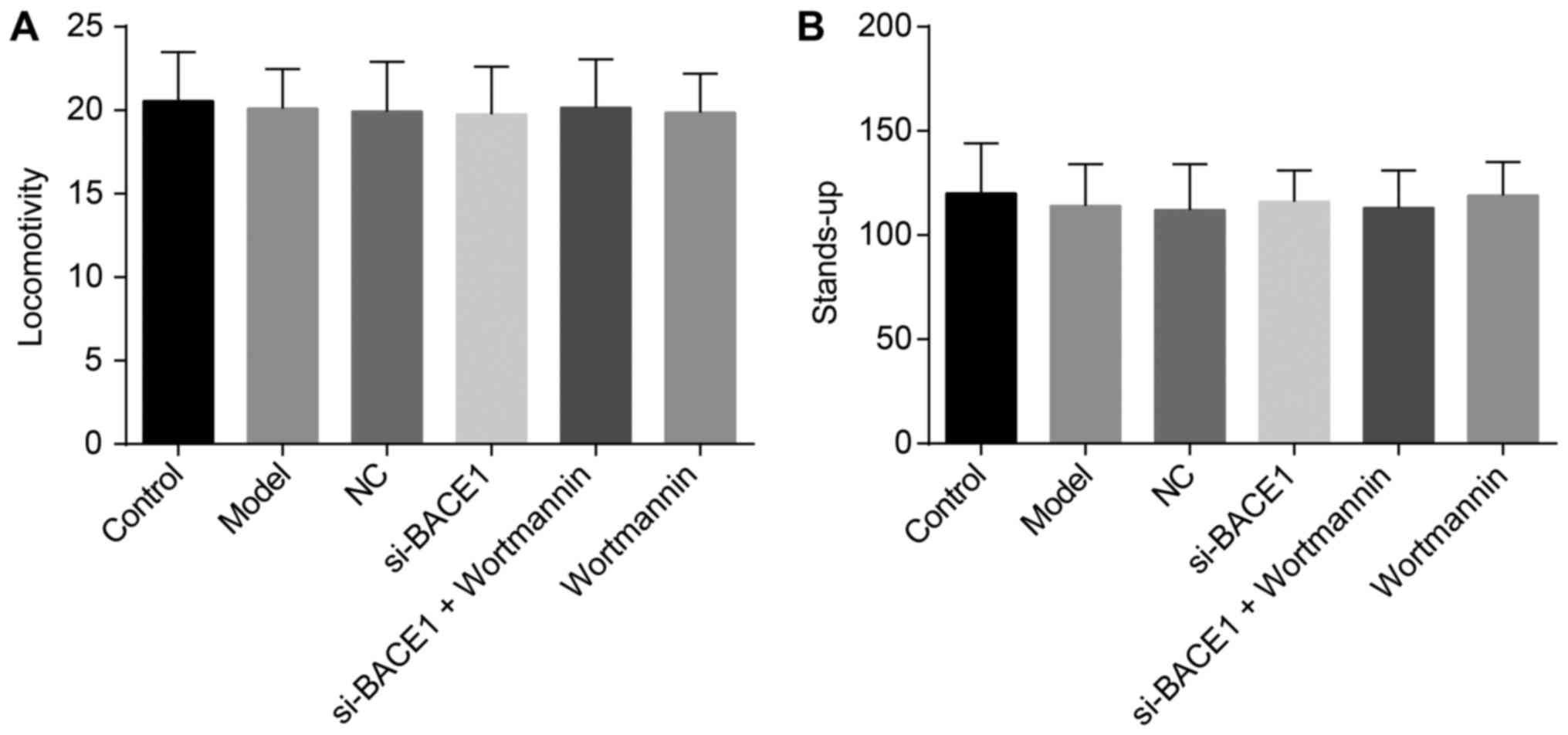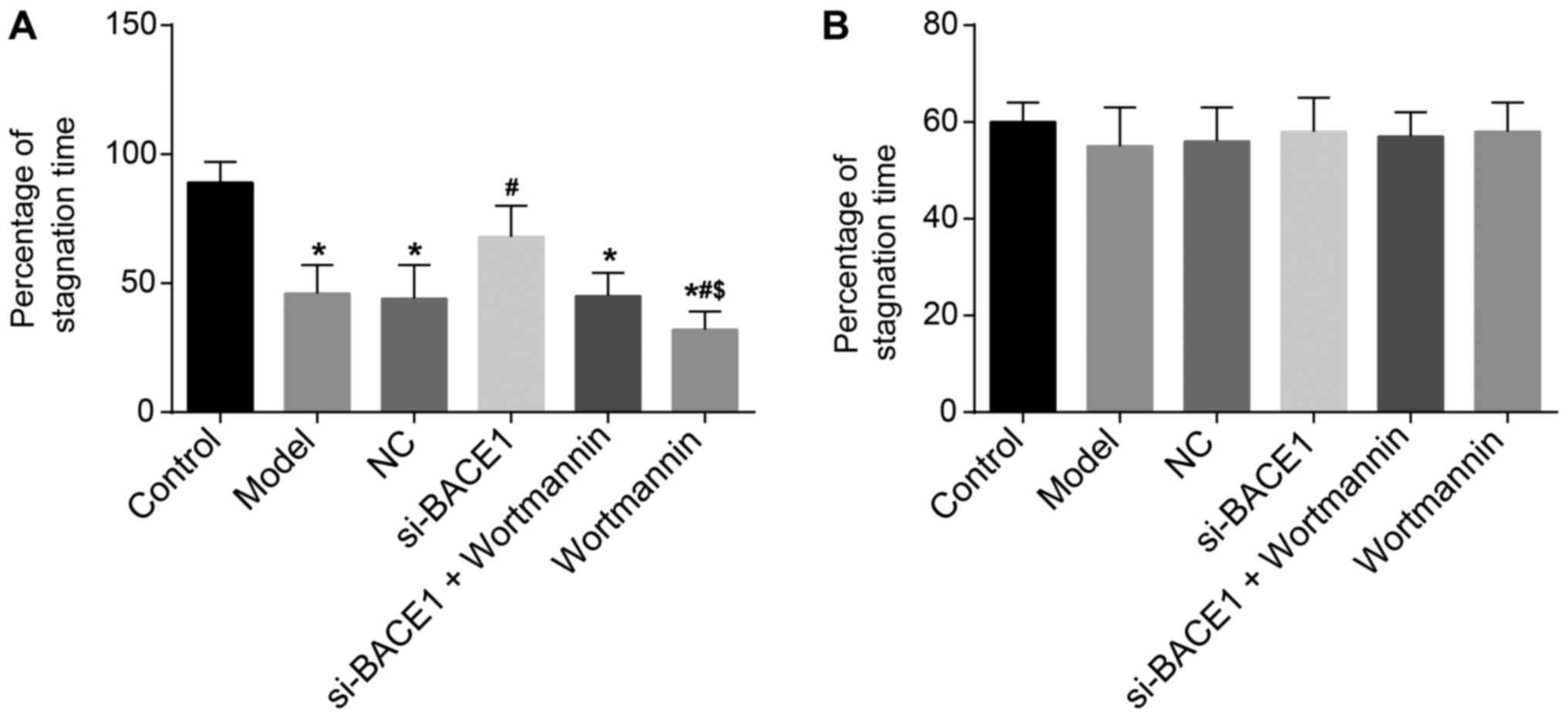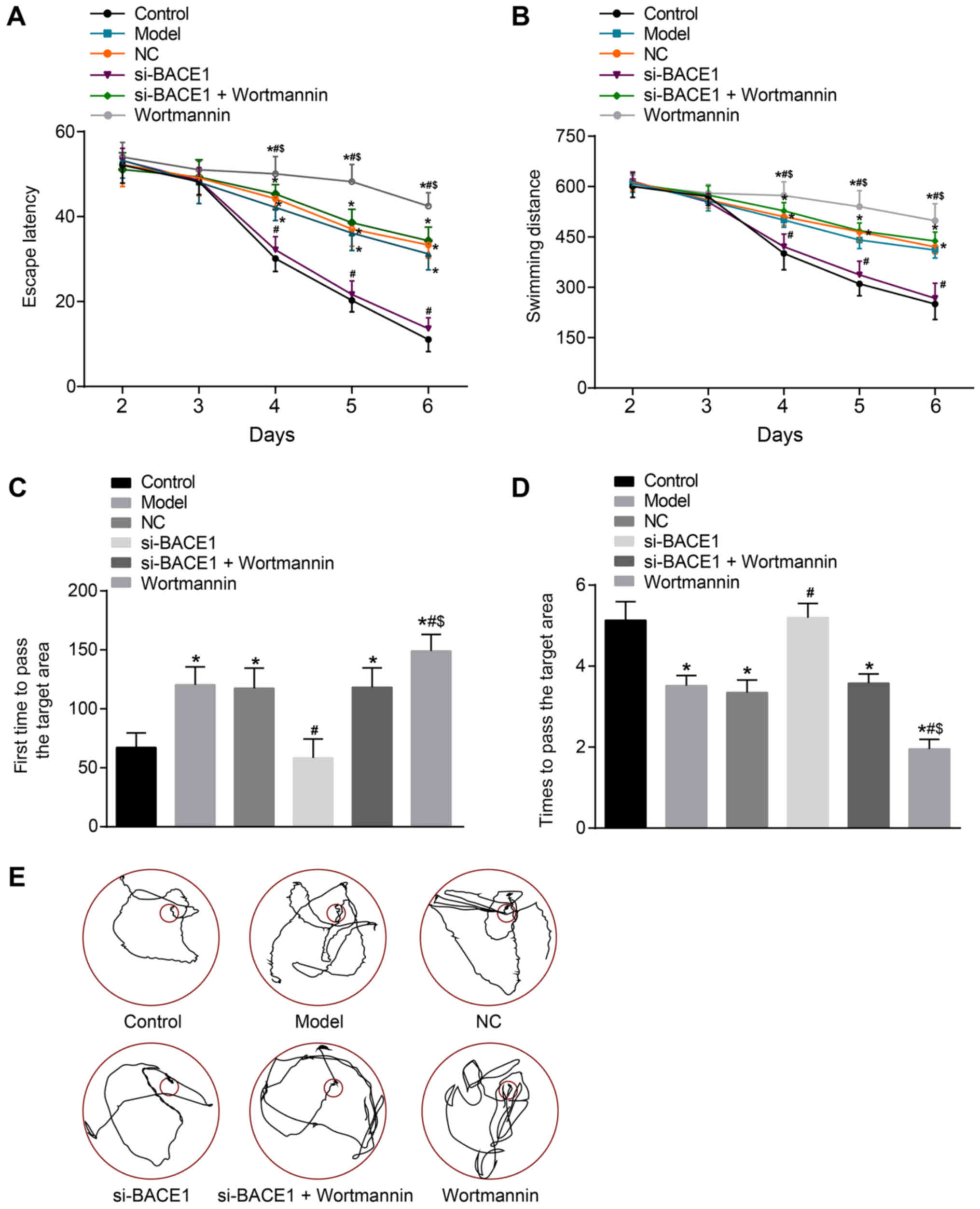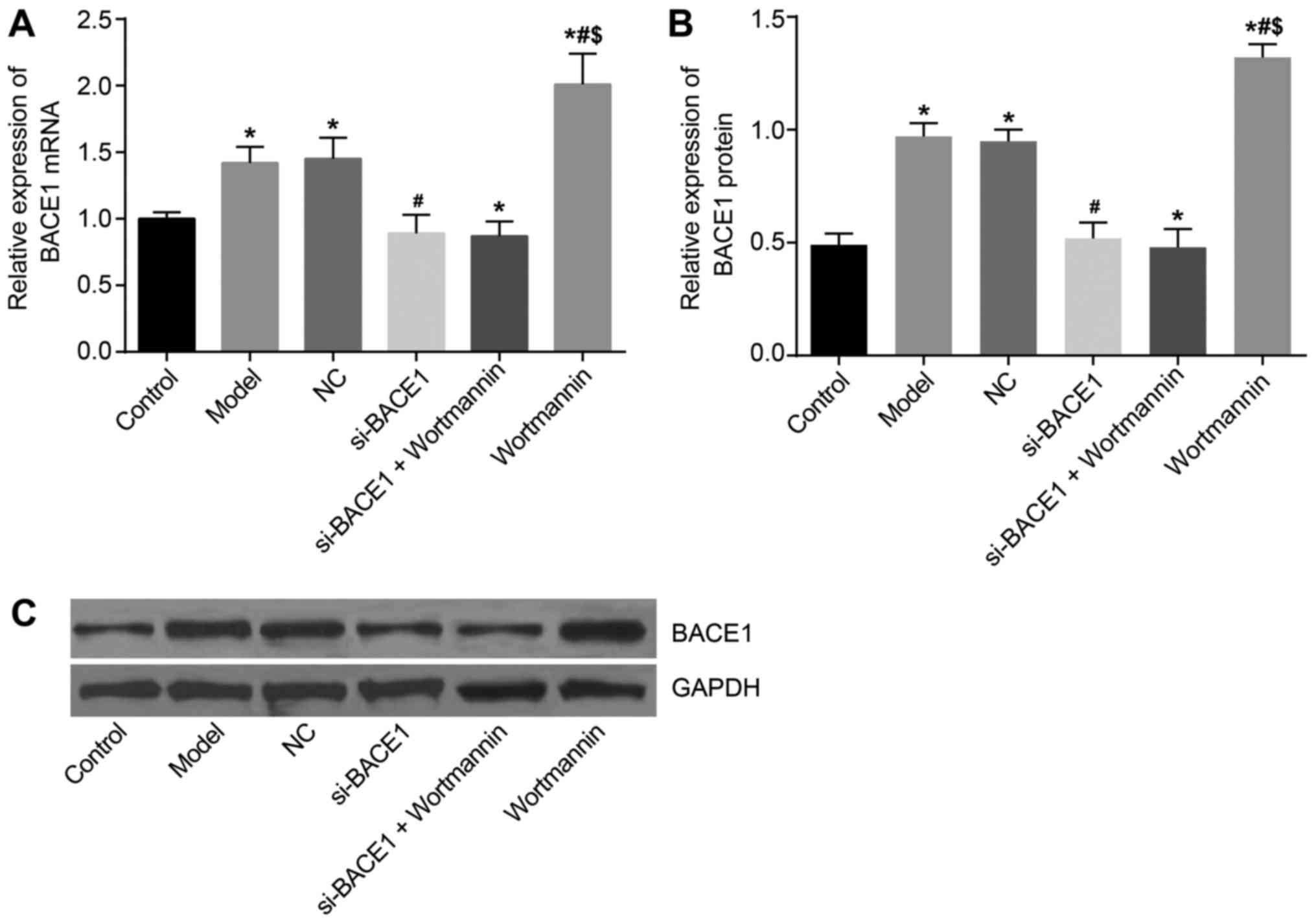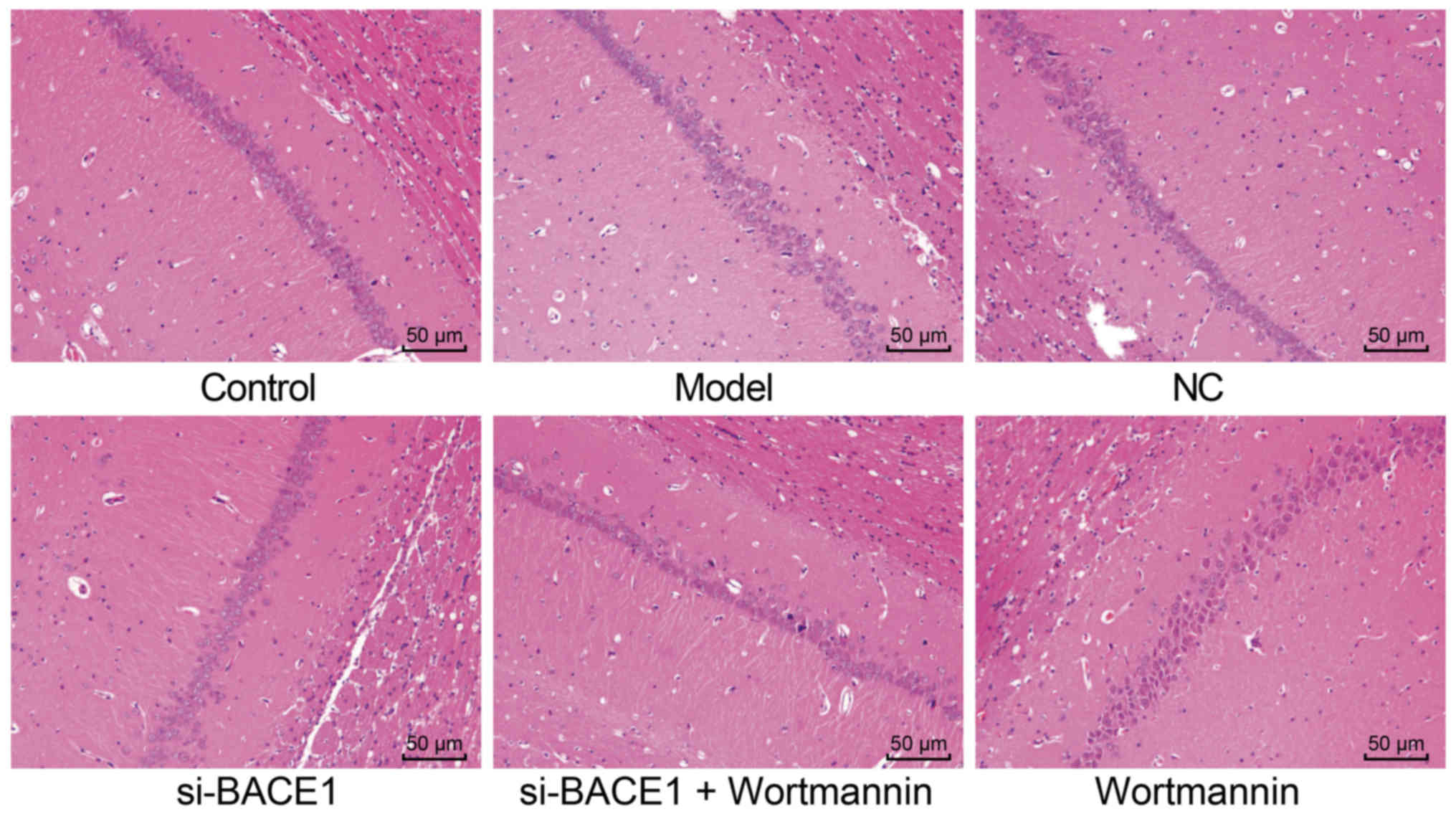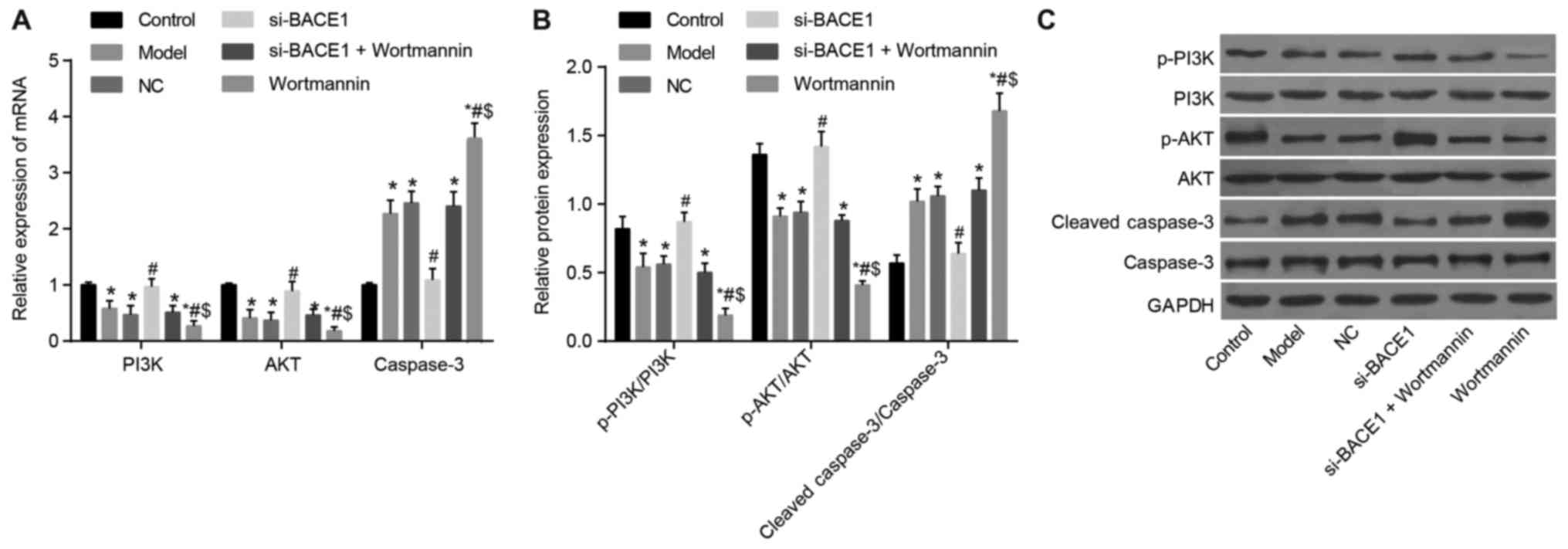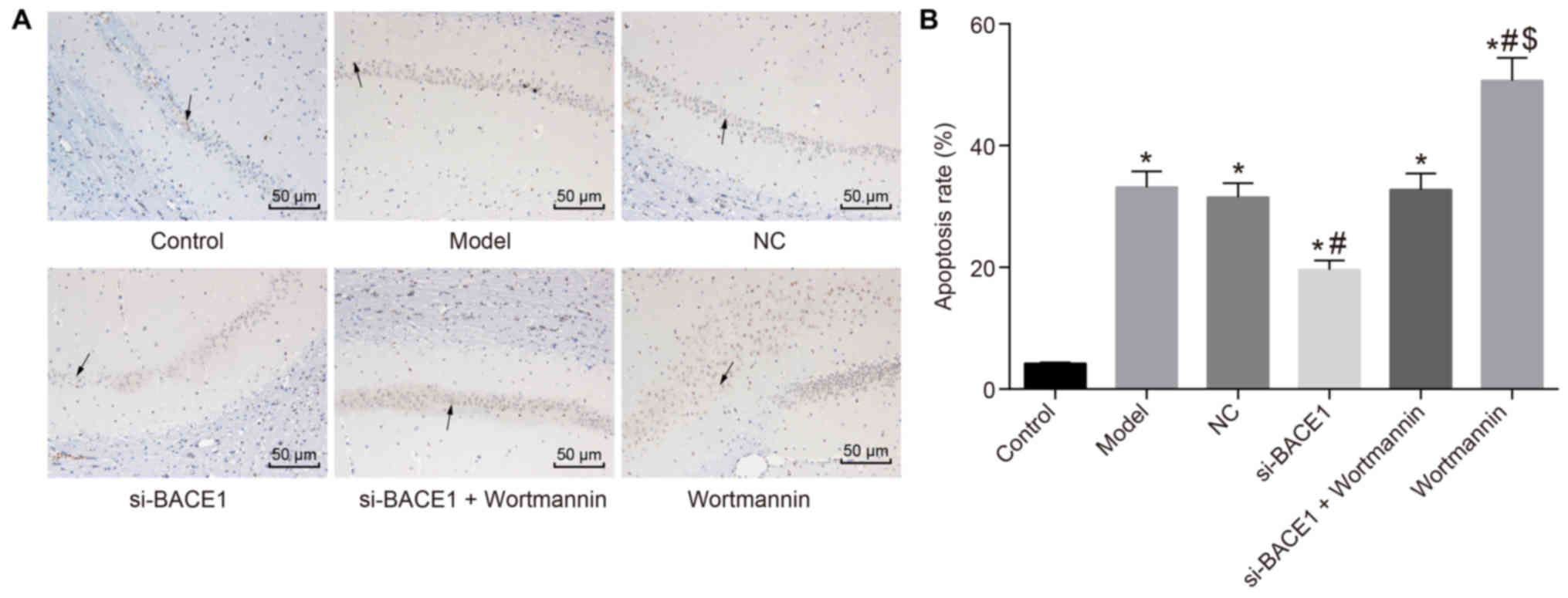|
1
|
Jungwirth B, Zieglgansberger W, Kochs E
and Rammes G: Anesthesia and postoperative cognitive dysfunction
(POCD). Mini Rev Med Chem. 9:1568–1579. 2009. View Article : Google Scholar : PubMed/NCBI
|
|
2
|
Peng L, Xu L and Ouyang W: Role of
peripheral inflammatory markers in postoperative cognitive
dysfunction (POCD): A meta-analysis. PLoS One. 8:e796242013.
View Article : Google Scholar : PubMed/NCBI
|
|
3
|
Ma Y, Cheng Q, Wang E, Li L and Zhang X:
Inhibiting tumor necrosis factor-α signaling attenuates
postoperative cognitive dysfunction in aged rats. Mol Med Rep.
12:3095–3100. 2015. View Article : Google Scholar : PubMed/NCBI
|
|
4
|
Ballard C, Jones E, Gauge N, Aarsland D,
Nilsen OB, Saxby BK, Lowery D, Corbett A, Wesnes K, Katsaiti E, et
al: Optimised anaesthesia to reduce post operative cognitive
decline (POCD) in older patients undergoing elective surgery, a
randomised controlled trial. PLoS One. 7:e374102012. View Article : Google Scholar : PubMed/NCBI
|
|
5
|
Liebert AD, Chow RT, Bicknell BT and
Varigos E: Neuroprotective effects against POCD by
Photobiomodulation: Evidence from assembly/disassembly of the
cytoskeleton. J Exp Neurosci. 10:1–19. 2016. View Article : Google Scholar : PubMed/NCBI
|
|
6
|
Zhang C, Li C, Xu Z, Zhao S, Li P, Cao J
and Mi W: The effect of surgical and psychological stress on
learning and memory function in aged C57BL/6 mice. Neuroscience.
320:210–220. 2016. View Article : Google Scholar : PubMed/NCBI
|
|
7
|
Wang Y, He H, Li D, Zhu W, Duan K, Le Y,
Liao Y and Ou Y: The role of the TLR4 signaling pathway in
cognitive deficits following surgery in aged rats. Mol Med Rep.
7:1137–1142. 2013. View Article : Google Scholar : PubMed/NCBI
|
|
8
|
Hu N, Wang C, Zheng Y, Ao J, Zhang C, Xie
K, Li Y, Wang H, Yu Y and Wang G: The role of the
Wnt/β-catenin-Annexin A1 pathway in the process of
sevoflurane-induced cognitive dysfunction. J Neurochem.
137:240–252. 2016. View Article : Google Scholar : PubMed/NCBI
|
|
9
|
Small DH, Mok SS and Bornstein JC:
Alzheimer's disease and Abeta toxicity: From top to bottom. Nat Rev
Neurosci. 2:595–598. 2001. View
Article : Google Scholar : PubMed/NCBI
|
|
10
|
Hu N, Wang M, Xie K, Wang H, Wang C, Wang
C, Wang C, Li Y, Yu Y and Wang G: Internalization of GluA2 and the
underlying mechanisms of cognitive decline in aged rats following
surgery and prolonged exposure to sevoflurane. Neurotoxicology.
49:94–103. 2015. View Article : Google Scholar : PubMed/NCBI
|
|
11
|
Hamilton DL, Findlay JA, Montagut G,
Meakin PJ, Bestow D, Jalicy SM and Ashford ML: Altered amyloid
precursor protein processing regulates glucose uptake and oxidation
in cultured rodent myotubes. Diabetologia. 57:1684–1692. 2014.
View Article : Google Scholar : PubMed/NCBI
|
|
12
|
He XL, Yan N, Chen XS, Qi YW, Yan Y and
Cai Z: Hydrogen sulfide down-regulates BACE1 and PS1 via activating
PI3K/Akt pathway in the brain of APP/PS1 transgenic mouse.
Pharmacol Rep. 68:975–982. 2016. View Article : Google Scholar : PubMed/NCBI
|
|
13
|
Sarker D, Reid AH, Yap TA and de Bono JS:
Targeting the PI3K/AKT pathway for the treatment of prostate
cancer. Clin Cancer Res. 15:4799–4805. 2009. View Article : Google Scholar : PubMed/NCBI
|
|
14
|
Arslan F, Lai RC, Smeets MB, Akeroyd L,
Choo A, Aguor EN, Timmers L, van Rijen HV, Doevendans PA,
Pasterkamp G, et al: Mesenchymal stem cell-derived exosomes
increase ATP levels, decrease oxidative stress and activate
PI3K/Akt pathway to enhance myocardial viability and prevent
adverse remodeling after myocardial ischemia/reperfusion injury.
Stem Cell Res. 10:301–312. 2013. View Article : Google Scholar : PubMed/NCBI
|
|
15
|
Deng Y, Wang Z, Wang R, Zhang X, Zhang S,
Wu Y, Staufenbiel M, Cai F and Song W: Amyloid-β protein (Aβ) Glu11
is the major β-secretase site of beta-site amyloid-β precursor
protein-cleaving enzyme 1 (BACE1) and shifting the cleavage site to
Aβ Asp1 contributes to Alzheimer pathogenesis. Eur J Neurosci.
37:1962–1969. 2013. View Article : Google Scholar : PubMed/NCBI
|
|
16
|
Shi X, Cai X, Di W, Li J, Xu X, Zhang A,
Qi W, Zhou Z and Fang Y: MFG-E8 selectively inhibited Aβ-induced
microglial M1 polarization via NF-κB and PI3K-Akt pathways. Mol
Neurobiol. 54:7777–7788. 2017. View Article : Google Scholar : PubMed/NCBI
|
|
17
|
Chiang HC, Wang L, Xie Z, Yau A and Zhong
Y: PI3 kinase signaling is involved in Abeta-induced memory loss in
Drosophila. Proc Natl Acad Sci USA. 107:7060–7065. 2010. View Article : Google Scholar : PubMed/NCBI
|
|
18
|
Qiang W, Yau WM, Lu JX, Collinge J and
Tycko R: Structural variation in amyloid-β fibrils from Alzheimer's
disease clinical subtypes. Nature. 541:217–221. 2017. View Article : Google Scholar : PubMed/NCBI
|
|
19
|
Szaruga M, Munteanu B, Lismont S, Veugelen
S, Horrè K, Mercken M, Saido TC, Ryan NS, De Vos T, Savvides SN, et
al: Alzheimer's-causing mutations shift Aβ length by destabilizing
γ-secretase-Aβn interactions. Cell. 170:443–456 e414. 2017.
View Article : Google Scholar : PubMed/NCBI
|
|
20
|
Zhao J, Fu Y, Yasvoina M, Shao P, Hitt B,
O'Connor T, Logan S, Maus E, Citron M, Berry R, et al: Beta-site
amyloid precursor protein cleaving enzyme 1 levels become elevated
in neurons around amyloid plaques: Implications for Alzheimer's
disease pathogenesis. J Neurosci. 27:3639–3649. 2007. View Article : Google Scholar : PubMed/NCBI
|
|
21
|
Portelius E, Dean RA, Andreasson U,
Mattsson N, Westerlund A, Olsson M, Demattos RB, Racke MM,
Zetterberg H, May PC and Blennow K: β-site amyloid precursor
protein-cleaving enzyme 1(BACE1) inhibitor treatment induces Aβ5-X
peptides through alternative amyloid precursor protein cleavage.
Alzheimers Res Ther. 6:752014. View Article : Google Scholar : PubMed/NCBI
|
|
22
|
Hunt KW, Cook AW, Watts RJ, Clark CT,
Vigers G, Smith D, Metcalf AT, Gunawardana IW, Burkard M, Cox AA,
et al: Spirocyclic β-site amyloid precursor protein cleaving enzyme
1 (BACE1) inhibitors: From hit to lowering of cerebrospinal fluid
(CSF) amyloid β in a higher species. J Med Chem. 56:3379–3403.
2013. View Article : Google Scholar : PubMed/NCBI
|
|
23
|
Mason TJ and Matthews M: Aquatic
environment, housing and management in the eighth edition of the
guide for the care and use of laboratory animals: Additional
considerations and recommendations. J Am Assoc Lab Anim Sci.
51:329–332. 2012.PubMed/NCBI
|
|
24
|
Livak KJ and Schmittgen TD: Analysis of
relative gene expression data using real-time quantitative pcr and
the 2(-Delta Delta C(T)) method. Methods. 25:402–408. 2001.
View Article : Google Scholar : PubMed/NCBI
|
|
25
|
Tuo YL, Li XM and Luo J: Long noncoding
RNA UCA1 modulates breast cancer cell growth and apoptosis through
decreasing tumor suppressive miR-143. Eur Rev Med Pharmacol Sci.
19:3403–3411. 2015.PubMed/NCBI
|
|
26
|
Holsinger RM, Goense N, Bohorquez J and
Strappe P: Splice variants of the Alzheimer's disease
beta-secretase, BACE1. Neurogenetics. 14:1–9. 2013. View Article : Google Scholar : PubMed/NCBI
|
|
27
|
Johnson JL, Chambers E and Jayasundera K:
Application of a bioinformatics-based approach to identify novel
putative in vivo BACE1 substrates. Biomed Eng Comput Biol. 5:1–15.
2013. View Article : Google Scholar : PubMed/NCBI
|
|
28
|
Kuk EB, Jo AR, Oh SI, Sohn HS, Seong SH,
Roy A, Choi JS and Jung HA: Anti-Alzheimer's disease activity of
compounds from the root bark of Morus alba L. Arch Pharm Res.
40:338–349. 2017. View Article : Google Scholar : PubMed/NCBI
|
|
29
|
Liu P, Cheng H, Roberts TM and Zhao JJ:
Targeting the phosphoinositide 3-kinase pathway in cancer. Nat Rev
Drug Discov. 8:627–644. 2009. View
Article : Google Scholar : PubMed/NCBI
|
|
30
|
Engelman JA: Targeting PI3K signalling in
cancer: Opportunities, challenges and limitations. Nat Rev Cancer.
9:550–562. 2009. View
Article : Google Scholar : PubMed/NCBI
|
|
31
|
Abliz A, Deng W, Sun R, Guo W, Zhao L and
Wang W: Wortmannin, PI3K/Akt signaling pathway inhibitor,
attenuates thyroid injury associated with severe acute pancreatitis
in rats. Int J Clin Exp Pathol. 8:13821–13833. 2015.PubMed/NCBI
|
|
32
|
Xu P, Wang J, Yang ZW, Lou XL and Chen C:
Regulatory roles of the PI3K/Akt signaling pathway in rats with
severe acute pancreatitis. PLoS One. 8:e817672013. View Article : Google Scholar : PubMed/NCBI
|
|
33
|
Devi L and Ohno M: Genetic reductions of
beta-site amyloid precursor protein-cleaving enzyme 1 and
amyloid-beta ameliorate impairment of conditioned taste aversion
memory in 5XFAD Alzheimer's disease model mice. Eur J Neurosci.
31:110–118. 2010. View Article : Google Scholar : PubMed/NCBI
|
|
34
|
Nishitsuji K, Tomiyama T, Ishibashi K, Ito
K, Teraoka R, Lambert MP, Klein WL and Mori H: The E693Delta
mutation in amyloid precursor protein increases intracellular
accumulation of amyloid beta oligomers and causes endoplasmic
reticulum stress-induced apoptosis in cultured cells. Am J Pathol.
174:957–969. 2009. View Article : Google Scholar : PubMed/NCBI
|
|
35
|
Thinakaran G and Koo EH: Amyloid precursor
protein trafficking, processing, and function. J Biol Chem.
283:29615–29619. 2008. View Article : Google Scholar : PubMed/NCBI
|
|
36
|
Tu S, Bhagat G, Cui G, Takaishi S,
Kurt-Jones EA, Rickman B, Betz KS, Penz-Oesterreicher M, Bjorkdahl
O, Fox JG and Wang TC: Overexpression of interleukin-1beta induces
gastric inflammation and cancer and mobilizes myeloid-derived
suppressor cells in mice. Cancer Cell. 14:408–419. 2008. View Article : Google Scholar : PubMed/NCBI
|
|
37
|
Smolen JS, Beaulieu A, Rubbert-Roth A,
Ramos-Remus C, Rovensky J, Alecock E, Woodworth T and Alten R;
OPTION Investigators, : Effect of interleukin-6 receptor inhibition
with tocilizumab in patients with rheumatoid arthritis (OPTION
study): A double-blind, placebo-controlled, randomised trial.
Lancet. 371:987–997. 2008. View Article : Google Scholar : PubMed/NCBI
|
|
38
|
Scheller J, Chalaris A, Schmidt-Arras D
and Rose-John S: The pro- and anti-inflammatory properties of the
cytokine interleukin-6. Biochim Biophys Acta. 1813:878–888. 2011.
View Article : Google Scholar : PubMed/NCBI
|
|
39
|
Miao HH, Zhen Y, Ding GN, Hong FX, Xie ZC
and Tian M: Ginsenoside Rg1 attenuates isoflurane-induced caspase-3
activation via inhibiting mitochondrial dysfunction. Biomed Environ
Sci. 28:116–126. 2015.PubMed/NCBI
|
|
40
|
Cibelli M, Fidalgo AR, Terrando N, Ma D,
Monaco C, Feldmann M, Takata M, Lever IJ, Nanchahal J, Fanselow MS
and Maze M: Role of interleukin-1beta in postoperative cognitive
dysfunction. Ann Neurol. 68:360–368. 2010. View Article : Google Scholar : PubMed/NCBI
|
|
41
|
Luo X, Yang L, Chen X and Li S: Tau
hyperphosphorylation: A downstream effector of isoflurane-induced
neuroinflammation in aged rodents. Med Hypotheses. 82:94–96. 2014.
View Article : Google Scholar : PubMed/NCBI
|
|
42
|
Berger M, Nadler JW, Browndyke J, Terrando
N, Ponnusamy V, Cohen HJ, Whitson HE and Mathew JP: Postoperative
cognitive dysfunction: Minding the gaps in our knowledge of a
common postoperative complication in the elderly. Anesthesiol Clin.
33:517–550. 2015. View Article : Google Scholar : PubMed/NCBI
|
|
43
|
Chen X, Wang W, Zhang J, Li S, Zhao Y, Tan
L and Luo A: Involvement of caspase-3/PTEN signaling pathway in
isoflurane-induced decrease of self-renewal capacity of hippocampal
neural precursor cells. Brain Res. 1625:275–286. 2015. View Article : Google Scholar : PubMed/NCBI
|
|
44
|
Lin D and Zuo Z: Isoflurane induces
hippocampal cell injury and cognitive impairments in adult rats.
Neuropharmacology. 61:1354–1359. 2011. View Article : Google Scholar : PubMed/NCBI
|
|
45
|
Yang C, Zhu B, Ding J and Wang ZG:
Isoflurane anesthesia aggravates cognitive impairment in
streptozotocin-induced diabetic rats. Int J Clin Exp Med.
7:903–910. 2014.PubMed/NCBI
|















